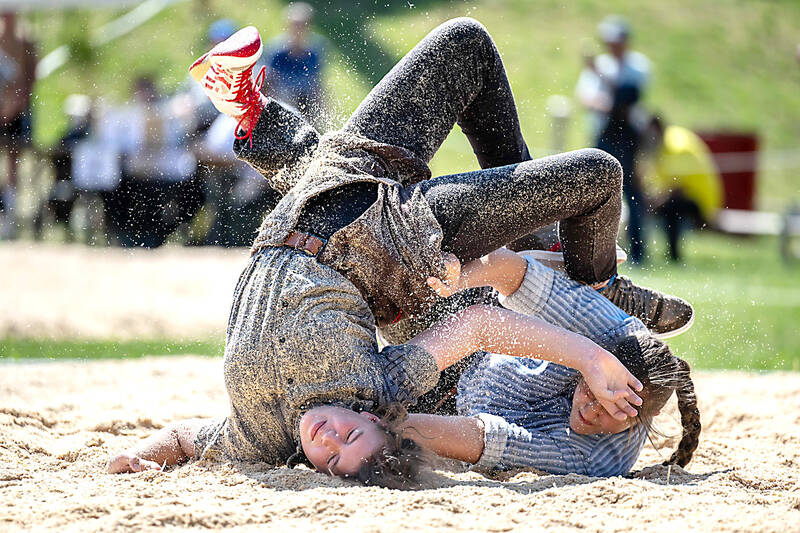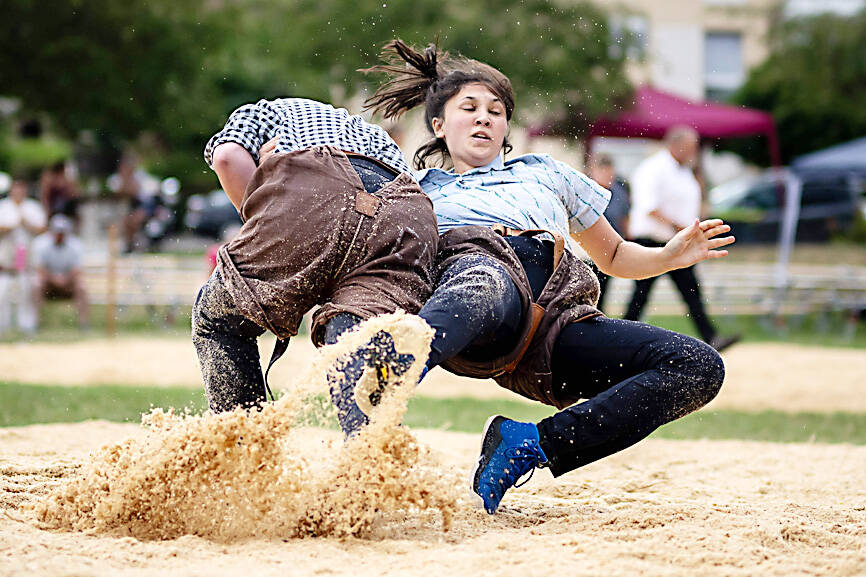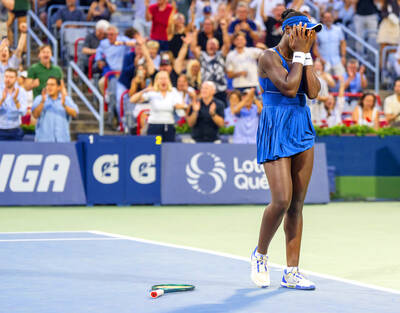Traditional Swiss wrestling, known as “schwingen” in German, has been a male preserve for centuries — the ultimate test of manhood for Alpine alpha males.
Yet a growing number of women are trying to muscle their way into Switzerland’s top homegrown sport, despite opposition from some men.
Schwingen pits two strapping wrestlers in baggy belted breeches against each other. To win, they must pin their opponent’s shoulder blades to the ground in the sawdust ring, with one keeping one hand gripped to the other wrestler’s shorts.

Photo: AFP
While about 6,000 men are registered with schwingen clubs, only 200 women and girls are formally involved in the sport, which is also known as “hosenlupf” or “breeches lifting.”
Faced with entrenched male opposition, the women created their own federation in 1992 and went their own way, but such is the level of overlap — with men and women using the same judges and venues — that some feel a merger is only a matter of time.
Anne Cardinaux, head of the organizing committee of the Romandy wrestling festival in the hills above Lausanne, said that women wrestlers “are still not accepted among the men, not in the same federation, but they’ll try to get there one day.”

Photo: AFP
While a few thousand spectators were expected for the men’s festival in Romanel-sur-Lausanne, several hundred watched the women’s events the day before.
“We are showing off the sport. People who are unaware of it are discovering it,” Romandy Women’s Swiss Wrestling Association spokeswoman Brigitte Foulk said.
Proudly rural, the amateur sport’s heartland is in the German-speaking cantons, but the original handful of women wrestlers in Romandy in the French-speaking west has now swelled to 34.
“It’s growing bit-by-bit by word of mouth. Sisters see their brothers wrestling and want to give it a go,” Foulk said.
Schwingen might be little known outside Switzerland, but tournaments are shown live on Swiss TV and the top wrestlers are celebrities.
The national festival takes place every three years and draws crowds of more than 50,000, with the winner crowned the “schwingerkonig” — the king of the schwingers.
Despite the brute force required to win, schwingen is a convivial sport. Each bout starts and ends in a handshake, with the winner brushing the sawdust off their opponent’s back.
The prizes are similarly old school. The top one for men is typically a bull.
At Romanel, in a gesture of equality, the women’s champion won a pregnant heifer.
“Normally we have lesser prizes. Five years ago we won a jar of honey and everyone was happy,” said Federal Women’s Wrestling Association president Franziska Ruch, who is also a competitor.
The Romanel women’s festival played out to up-tempo accordion music, occasionally interspersed with live yodeling. Following bouts, competitors gasped for air in the 32°C heat, then dunked their heads in a water trough. They faced six opponents throughout the day.
The five-minute contests take place in a 12m wide sawdust ring, scored by three judges, with points totaled up at the end of six bouts to determine who goes through to the finals.
“It’s high concentration and it’s also mental. You must prepare,” said 18-year-old Antonia Bucher, her face covered in sawdust.
Schwingen is very much a family affair, the apprentice carpenter said.
Most female wrestlers “have schwingen family, brothers, fathers or friends who also do this and then they kind of slide into this,” Bucher said.
“My friends did it and now I’m doing it,” she added.
However, she said that “not everyone accepts” women joining the wrestling ranks.
“The older men think women [should] stay in the kitchen. Not all the time, but often,” Bucher said.
Bob Blanchette, one of the senior festival judges, said talks were under way about the national men’s federation sharing resources and opportunities with the women.
“There’s no reason that women can’t participate in it, and that the men can’t help them to promote the sport,” he said. “It’s been a lot of work to change the mentality.”
The Romanel grand final saw Isabel Egli triumph after a long battle with her competitor.
The 26-year-old nurse from the central Lucerne region was lifted shoulder-high to applause, then submerged in a pile-on as her Steinhuserberg schwingen clubmates and children charged in.
Posing with her prize heifer, she said she could hardly believe what she had achieved.
“It is just magnificent,” she said.

Taiwan’s top women’s badminton doubles duo, Hsieh Pei-shan (謝沛珊) and Hung En-tzu (洪恩慈), achieved a straight-sets victory over Japan’s Kaho Osawa and Mayui Tanabe at the Badminton World Federation (BWF) Super 300 Macau Open on Sunday. The Taiwanese pair won the final 21-18, 21-12, marking the duo’s second title this year after their win at the BWF Super 300 Taipei Open in May. The match on Sunday was their first encounter with the Japanese duo, ranked No. 63 in the world. Hsieh and Hung, ranked No. 12, began the opening game well. Hung, who plays left-handed, performed strongly at both the net and the

Canadian teenager Victoria Mboko upset top-seeded Coco Gauff 6-1, 6-4 on Saturday night to reach the National Bank Open quarter-finals. “Your support was incredible,” Mboko told the crowd in French after a chorus of “Ole, Ole, Ole” chants echoed around the venue. “I’m really happy to win today ... It’s incredible. I’m so happy to beat such a great champion.” Gauff dropped to 2-3 since winning the French Open. She followed the major victory with opening losses in Berlin and Wimbledon, then overcame double-fault problems to win two three-set matches in Montreal. Gauff had five double-faults on Saturday after having 23 in

Formula 1 champion Max Verstappen on Thursday said that he is staying with the Red Bull team next year, ending months of speculation over his future. “Some people just like to stir the pot, some people just like to create drama, but, for me, it’s always been quite clear, and also for next year,” the four-time champion said ahead of the Hungarian Grand Prix. “I’m discussing with the team already the plans — the things that we want to change for next year, so that means that I’m also staying with the team for next year,” he said. Verstappen has a contract with

Alex Michelsen on Thursday rallied for a 3-6, 7-6 (7/4), 6-4 upset victory over third-seeded Lorenzo Musetti in the men’s singles, converting his seventh match point to reach the fourth round of the Canadian Open. Michelsen reached the last 16 of a Masters 1000 for the first time with his second win over a top-10 player in eight attempts. The 20-year-old American survived nearly 50 unforced errors and converted just two of nine break chances, but it was enough to vanquish Italy’s Musetti, a two-time Grand Slam semi-finalist ranked 10th in the world. “It feels really good,” the 26th-ranked Michelsen said. “I’ve put